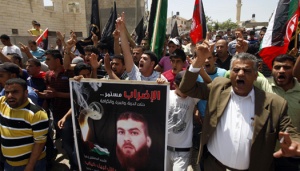To: Ms. Navanethem Pillay, UN High Commissioner for Human Rights
Cc: Ms. Valerie Amos, Under-Secretary-General and Emergency Relief Coordinator, OCHA
Mr. Robert H. Serry, Special Coordinator, UNSCO
Ms. Helen Clark, Administrator, UNDP
Ms. Michele Bachelet, Executive Director, UN Women
Ms. Margaret Chan, Director-General, WHO
As organizations dedicated to the promotion and protection of human rights, we, the undersigned NGOs, urgently request your intervention in respect to more than 2,000 Palestinian political prisoners who are currently engaged in an open-ended hunger strike that is now in its fourth week. Of particular concern are the lives of Bilal Diab and Thaer Halahleh, who are on their 73rd day of hunger strike. Both men are at immediate risk of death and have been subjected to severe medical negligence on the part of the Israeli Prison Service (IPS). Despite their critical condition, the Israeli High Court ruled against the appeals of their administrative detention orders. According to Physicians for Human Rights-Israel, this judgment was tantamount to a death sentence. An Israeli District Court also upheld a decision by the IPS not to allow them any family visits. In total, there are 4,653 Palestinian political prisoners, including 218 children (33 of whom are under the age of 16), in Israeli prisons.
![Hundreds of prisoners are on hunger strike to oppose administrative detention and demand better conditions [Reuters] Hunger-Strike](/cached_uploads/resize/400/200/alhaq_files/images/stories/Images/2012/Hunger-Strike.jpg) The hunger strikers have communicated the reasons underlying their hunger strike, which mainly address the extremely dire conditions in the prisons and punitive measures by the Israeli Prison Service; the policy of arbitrary internment without charge or trial, also referred to as administrative detention and including Israel’s Unlawful Combatants Law; Israel’s policy of collective punishment and punitive measures which were either introduced or intensified following the capture of Gilad Shalit in 2006, and which continue despite his release, including the denial of family visits to prisoners from the Gaza Strip; restriction on higher education for all prisoners and the excessive, abusive and hence, unlawful employment of solitary confinement and prolonged isolation; and forceful strip searches of prisoners and their visitors. These demands are similar to the demands that were raised in the preceding hunger strike that took place in September 2011, which ended after promises by Israel and the Israeli Prison Service therein to change these polices. No changes, whether structural or in policy, were made and the issue was overshadowed by the prisoner exchange deal in October.
The hunger strikers have communicated the reasons underlying their hunger strike, which mainly address the extremely dire conditions in the prisons and punitive measures by the Israeli Prison Service; the policy of arbitrary internment without charge or trial, also referred to as administrative detention and including Israel’s Unlawful Combatants Law; Israel’s policy of collective punishment and punitive measures which were either introduced or intensified following the capture of Gilad Shalit in 2006, and which continue despite his release, including the denial of family visits to prisoners from the Gaza Strip; restriction on higher education for all prisoners and the excessive, abusive and hence, unlawful employment of solitary confinement and prolonged isolation; and forceful strip searches of prisoners and their visitors. These demands are similar to the demands that were raised in the preceding hunger strike that took place in September 2011, which ended after promises by Israel and the Israeli Prison Service therein to change these polices. No changes, whether structural or in policy, were made and the issue was overshadowed by the prisoner exchange deal in October.
The hunger strike launched on 17 April 2012 was preceded by the hunger strikes carried out by individuals mainly in protest against the arbitrary policy of administrative detention, in addition to torture, inhuman and degrading treatment.
While the previous hunger strikes of Khader Adnan and Hana Shalabi and the international attention related to their hunger strikes have pressured Israel into negotiations and the concluding of individual ‘agreements’ on the terms of their release, the general policy in respect to the arbitrary detention of 308 administrative detainees (including 24 Palestinian Legislative Council members) for extensive periods of time, has not changed.
On the contrary, Israel and the Israeli Prison Service have intensified their efforts in thwarting the hunger strikes by maximizing punitive measures against those involved, including isolating hunger strikers, transferring prisoners between different prisons, daily fines of up to 100 euro, denial of electricity and water supply, introducing new questionable measures such as forced DNA sampling, and both directly and indirectly limiting their access to lawyers and independent physicians.
The recent and ongoing hunger strikes are not only a means of protest and method of exerting pressure on Israel, but also an appeal of last resort to all; they are an act in which imminent death is weighed against the minimum standards required for living in dignity.
Israel’s lack of seriousness in acting upon UN statements and the recommendations of several concluding observations as they pertain to prisoners amongst countless other human rights and humanitarian violations has not only catalyzed these hunger strikes, it undermines the role of the UN in ensuring State compliance and respect for international law and human rights for all. We, as human rights defenders, fear that Israel’s disregard for international law has an increasingly adverse impact on the promotion of human rights and contributes to a state of impunity.
In this vein, we appeal to you to intervene in the strongest manner possible to protest the lack of compliance and accountability demonstrated by the State of Israel in affording Palestinian prisoners the standard minimum rules for the treatment of prisoners and progressive implementation of human rights law as it pertains to Palestinians and Palestinian prisoners and in fulfillment of the UN bodies’ concluding observations and recommendations.
Furthermore, given the gravity of the current situation, and the increasingly perilous medical conditions of prisoners on protracted hunger strike, we hope that both public and undisclosed channels of communication are utilized to ensure that urgent attention and action are invested in pressuring Israel to bring its practices in alignment with international human rights law.
Indeed, these principles are laid out in the UN Minimum Standard Rules of the Treatment of Detainees, the Body of Principles for the Protection of all Persons under Any Form of Detention or Imprisonment and the Basic Principles of Treatment of Prisoners, which was adopted by General Assembly Resolution 45/111 in 1990. These include unconditional access to adequate medical care from independent physicians, securing conditions that adhere to international standards during the independent physicians’ visits, and allowing family visitations to all prisoners, especially those in critical condition.
Sincerely,
The Palestinian Council of Human Rights Organizations and Physicians for Human Rights-Israel:
|
|
|
|
|
|
|
 |
Addameer Prisoners’ Support and Human Rights Association
Sahar Francis
General Director |
 |
|
Aldameer Association for Human Rights
Khalil Abu Shammala
General Director
|
 |
Al-Haq
Shawan Jabarin
General Director
|
 |
|
Al Mezan Center for Human Rights
Issam Younis
General Director |
 |
Badil Resource Center for Palestinian Residency and Refugee Rights
Najwa Darwish
General Director
|
 |
|
Defence for Children International
Palestine Section
Rifat Kassis
General Director
|
 |
Ensan Center for Human Rights and Democracy
Shawqi Issa
General Director
|
 |
|
Hurryyat - Centre for Defense of Liberties and Civil Rights
Helmi Al-araj
General Director
|
 |
Jerusalem Center for Legal Aid and Human Rights
Issam Aruri
General Director
|
 |
|
Ramallah Center for Human Rights Studies
Iyad Barghouti
General Director
|
 |
Women’s Centre for Legal Aid and Counselling
Maha Abu Dayyeh
General Director
|
 |
|
Physicians for Human Rights - Israel
Ran Cohen
Executive Director
|



![Hundreds of prisoners are on hunger strike to oppose administrative detention and demand better conditions [Reuters] Hunger-Strike](/cached_uploads/resize/400/200/alhaq_files/images/stories/Images/2012/Hunger-Strike.jpg) The hunger strikers have communicated the reasons underlying their hunger strike, which mainly address the extremely dire conditions in the prisons and punitive measures by the Israeli Prison Service; the policy of arbitrary internment without charge or trial, also referred to as administrative detention and including Israel’s Unlawful Combatants Law; Israel’s policy of collective punishment and punitive measures which were either introduced or intensified following the capture of Gilad Shalit in 2006, and which continue despite his release, including the denial of family visits to prisoners from the Gaza Strip; restriction on higher education for all prisoners and the excessive, abusive and hence, unlawful employment of solitary confinement and prolonged isolation; and forceful strip searches of prisoners and their visitors. These demands are similar to the demands that were raised in the preceding hunger strike that took place in September 2011, which ended after promises by Israel and the Israeli Prison Service therein to change these polices. No changes, whether structural or in policy, were made and the issue was overshadowed by the prisoner exchange deal in October.
The hunger strikers have communicated the reasons underlying their hunger strike, which mainly address the extremely dire conditions in the prisons and punitive measures by the Israeli Prison Service; the policy of arbitrary internment without charge or trial, also referred to as administrative detention and including Israel’s Unlawful Combatants Law; Israel’s policy of collective punishment and punitive measures which were either introduced or intensified following the capture of Gilad Shalit in 2006, and which continue despite his release, including the denial of family visits to prisoners from the Gaza Strip; restriction on higher education for all prisoners and the excessive, abusive and hence, unlawful employment of solitary confinement and prolonged isolation; and forceful strip searches of prisoners and their visitors. These demands are similar to the demands that were raised in the preceding hunger strike that took place in September 2011, which ended after promises by Israel and the Israeli Prison Service therein to change these polices. No changes, whether structural or in policy, were made and the issue was overshadowed by the prisoner exchange deal in October.










